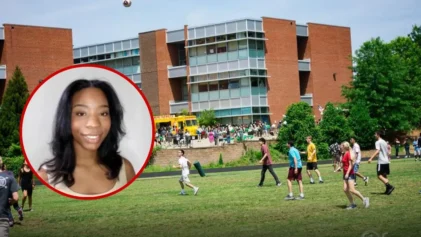An elderly New York man says he is being forced to live in dangerous and unbearable conditions as he is harassed by another tenant who has invited drug use and created a homeless encampment at the entrance of the apartment he has lived in for over 20 years.
Francis Roberts, 77, believes the other tenant in his Crown Heights brownstone is working with the building’s landlord to drive him out of the basement apartment where he is paying $450 per month under the city’s rent-stabilized laws. The median rent in the gentrifying Brooklyn neighborhood is now $3,000 a month.
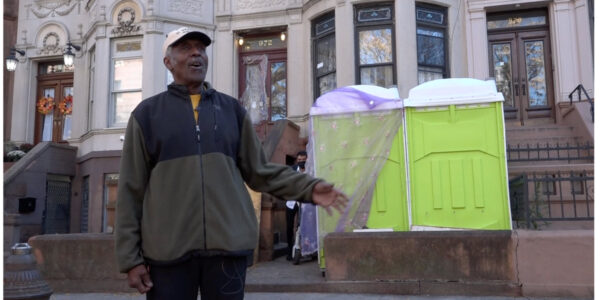
Since Aaron Akaberi, 36, moved in the building in June, he has been playing loud music “24/7,” according to Roberts’ neighbor, Maria Florez.
Akaberi and his drug-addicted “associates” have broken into Roberts’ apartment and stationed overflowing portable bathrooms, makeshift tents, trash, a smoking barbecue grill and drug paraphernalia by his door, Roberts complains. Every time police or neighbors remove the items, Akaberi and the squatters move them closer to his door, according to a lawsuit filed against Roberts’ landlord and the city’s Department of Housing Preservation and Development.
They have also locked the elderly man out of his home, broken his locks and doors, and let a pitbull and chickens roam free in front of his unit. The landlord has also failed to fix the deteriorating building that was deemed so dilapidated that it was under court-ordered management by the city for buildings in dire condition.
“This is criminal. This is heartless,” Roberts said in a news release.
Brooklyn Legal Services’ Tenant Rights Coalition filed the suit on behalf of Roberts, adding the corporate owner’s officer and the property manager to the filing on Nov. 17. They are demanding that the landlord, 972 Park Place LLC, correct 240 violations in the building and stop the harassment.
There is a green substance leaking in Roberts’ kitchen ceiling that he believes could be toxic and sewage is backing up in the sink there. His unit has faulty electrical wiring, holes in the floors and walls and other structural issues. There is also mold growing from a defective sewage system.
The landlord has offered to let Roberts occupy a new apartment while the repairs are done, but Roberts refused. He believes it is just a ploy to get him out of the unit so that the company could renovate it and price him out. The company bought the 10-unit building for a discount of $1.3 million because of its deteriorated condition.
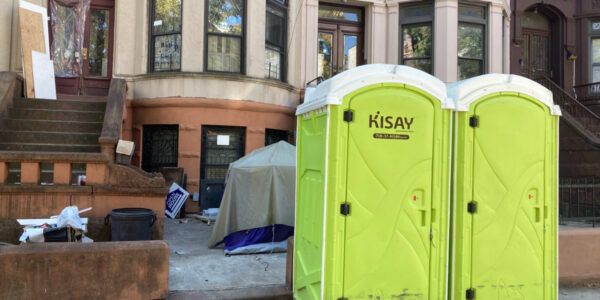
Roberts is one of the thousands of Black, elderly New Yorkers targeted for displacement by deplorable living conditions to “turn a profit,” Brooklyn Legal Services said.
Once a majority-Black neighborhood, Crown Heights’ Black population declined by 18,750 people between 2010 and 2020, the U.S Census shows.
In 2000, 78 percent of the neighborhood’s population was Black and about 7 percent of residents were white, according to New York University’s Furman Center. By 2020, less than half of the residents were Black and white people now account for more than half of the neighborhood’s population, Census data shows.
Crown Heights is one of the fastest-gentrifying neighborhoods among the five boroughs. Not only does it have the fastest-growing white population, but there has also been an increase of people who identify as other or “multi-racial,” and the Hispanic and Asian populations have also grown, data shows.
Before the last decade, Robert’s landlord was Barbadian-American, and like him, most of the other tenants were Afro-Caribbean. However, many of them left as the building changed owners and conditions started to decline.
“All your neighbors knew you. You knew all your neighbors,” Roberts recalled to News 12. “It was just a joy living on this block.”
Former tenant Curen Sutherland-Goddard told The New York Times she accepted a $150,000 buyout from a previous landlord to give up their $380-a-month apartment. She now lives in East New York for $2,000 a month.
Brian Villaroel, who lives on Roberts’ block, said he tried to defuse a confrontation between Akaberi, a white Jewish man, and one of the volunteers, who was attempting to remove the makeshift tent and garbage in front of the basement apartment in August.
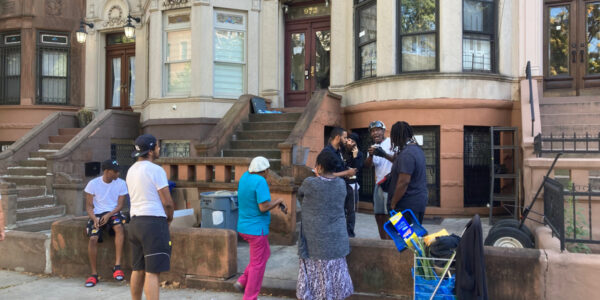
According to court documents, a group of younger residents was removing “tents, garbage, and human waste from the space in front of Mr. Roberts’ unit,” and Akaberi started swinging a pole.
Others said he also had a weapon in his hand. One of the volunteers grabbed a stick to “swing back,” but Villaroel stepped between them.
However, Villaroel said Akaberi refused to back down, even after the volunteer walked away.
“One member of this group said that he would shoot the next person to take garbage away from the property,” Villaroel wrote in an affidavit to the court. “Mr. Akaberi himself repeatedly said ‘I’ll kill you’ to those trying to throw away the garbage.”
Akaberi then turned the pole on Villaroel while he spoke to the police and “resisted detainment,” the neighbor said.
Reports show Akaberi has a storied criminal past. In 2015, he was arrested in a Flatbush drug bust where he led police on a helicopter chase as he used ladders to escape to the roof. Cops reportedly found cocaine, crystal meth, marijuana, Xanax, drug scales and a credit card skimmer in Akaberi’s home.
In 2014, he was arrested for stashing two guns and a slew of drugs in a closet at a Jewish youth center in Crown Heights.
Villaroel said it is known in the community that Akaberi sells drugs, and he has witnessed Akaberi and his customers use crack cocaine and heroin “in plain view of the whole block.”
“On any given day since June 2022, I have seen up to 50 or 60 associates of Mr. Akaberi enter his unit above Mr. Roberts’ unit,” Villaroel wrote.
One day Villaroel confronted one of Akaberi’s “associates” about why he was hanging around the apartment. He “said to me that their purpose was to ‘get that n—- out of his unit,’” the neighbor said. Brooklyn Legal Services also included a picture of a noose hanging from a tree in the case files.
Akaberi has denied colluding with the landlord to push Roberts out. He told The New York Times that he is “absolutely not” harassing the elderly Black man.
An attorney for the landlord told the paper that the reported harassment is a “dispute between tenants” and his client, Yehuda Gruenberg, has “no control of third parties and other tenant/s on the premises.”
Attorney Julius Toonkel also argued in court documents that Roberts has denied the company access to complete the repairs. Yet, Roberts has submitted a letter to the court addressed to the managing agent, granting access to the unit. Toonkel also contended that the tenant failed to give the landlord adequate time to respond to his requests and that some of the damages were caused by Roberts and are the tenant’s responsibility.
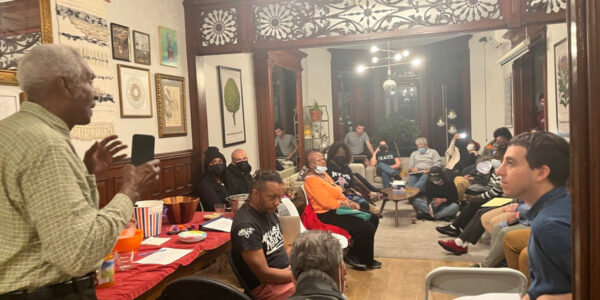
Dozens of Crown Heights residents and community groups have rallied behind Roberts to tackle the issue, relaunching a block association to protect their elderly neighbor.
“There was a block association here for decades that has been dormant for years because of displacement, but neighbors remember all of those years of neighbors protecting neighbors, raising each others’ children, celebrating together, which created the block that we have today,” Ari Brostoff of the Crown Heights Tenant Union said.
Some want the landlord to face charges and a new owner to take over the building and fix it.
“They’re making everybody’s life miserable on the block, and the fact they are making Francis’ life miserable is despicable,” said neighbor Hal Drellich.


